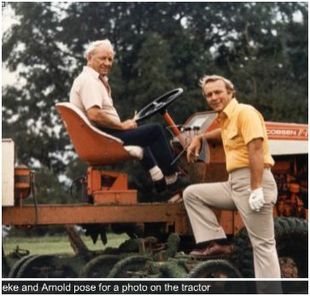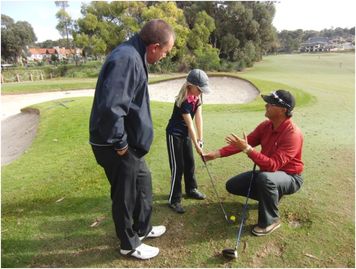"These two factors are critical for the junior to maintain interest and not drop out of the sport. Dropping out in any junior sport is unavoidable as not all kids like golf! But in a lot of cases of juniors dropping out can be traced back to parents putting too much pressure on the child in many different ways".  From Arnold Palmer, to Jack Nicklaus, and on to Tiger Woods, all these great golfers had parents that were a huge influence in their developing years in sport, and especially introducing them to the game of golf. Deacon Palmer, Charlie Nicklaus and Earl Woods were the coaches for their children when they first started out. I don't mean just in teaching the game, but instilling the values that the game of golf represents. Good sportsmanship, playing by the rules, and keeping a lid on temper tantrums on and off the course were traits that were expected of young Arnold, Jack and Tiger. The majority of golfers were introduced to golf by one or both of their parents, or grandparents, and some of the first things they do is to make sure the junior golfer receives a certain amount of self confidence and development of their self esteem. These two factors alone are critical for the junior to maintain interest and not drop out of the sport. Dropping out in any junior sport is unavoidable though as not all kids like golf! But in a lot of cases of juniors dropping out can be traced back to parents putting too much pressure on the child in many different ways. Parents mostly want and wish the best for their children but don't always know how to go about giving them this. Getting over-involved or being over protective is not recommended as the junior never learns to be responsible for his actions. It is also natural for parents to sometimes to live vicariously through the child, and when the parent's goals and expectations exceed the child's, added pressure is inevitable and the chance of the child dropping out increases dramatically.
Listed below are the Do's and Don'ts that will help guide you as a parent in nurturing your child's golf development. The Do's
Always look supportive, relaxed and comfortable on the course. This is really hard to do and takes a lot of practice! I had a father that hid behind trees because he believed that when his son saw him on course a bad hole would follow! Make sure your child's ego does not get too big as it's a recipe for disappointment when they have a bad day on course. And it will happen! The Don'ts
If the child is in a junior program or taking individual golf lessons don't give feedback to the child that is in conflict of what the professional is teaching. Don't use love to get the child to work harder. This does not work as the child is doing it to gain your attention not because he wants to improve his/her golf game.  If you are really serious for your child to enjoy and improve their golf game you have to learn to be involved in the right way. This means to always show interest in your child and constantly encouraging, them regardless of how they perform. Providing emotional support is without a doubt the single most important aspect of a parents role. Be prepared to take an active interest in your child's junior program at the club, and develop a relationship with the golf professional running the program because your understanding of the objectives of the golf program will help you and enrich the experience for everyone. You have every right to get feedback from the program professional, and if he/she doesn't, then go find another professional that will. Always check that your child has built a rapport with his/her professional, as this relationship is critical for the continued development and enjoyment of playing golf. So whether your child excels in golf, or just plays the game for the simple joy of it, you will know that you played a major role in it and also helped make them a better person because of it. And that's a win/win situation for all. David Milne and Lawrie Montague - Pro Tour Golf College Your Success On Tour is Our Business
RoB I am
11/6/2013 06:15:11 pm
One main point is also to pursure and support struggle and practice that they are learning to do not that they are good or bad. Comments are closed.
|
Archives
June 2019
|
Proudly Supported By
Copyright © 2011 - 2018 Pro Tour Golf College
Website Managed By Golf Performance Media
All Rights Reserved
Website Managed By Golf Performance Media
All Rights Reserved

 RSS Feed
RSS Feed



